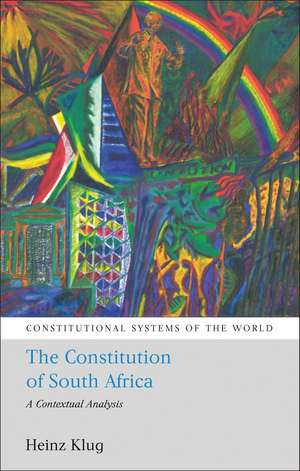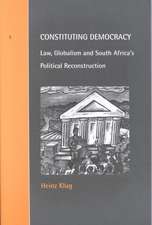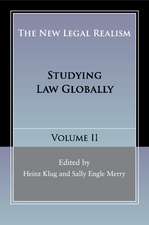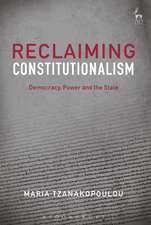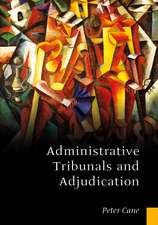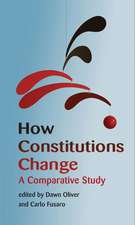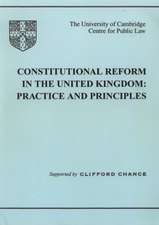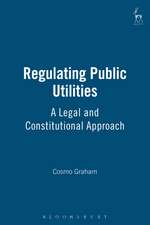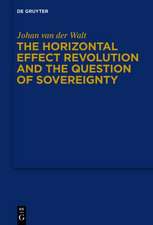The Constitution of South Africa: A Contextual Analysis: Constitutional Systems of the World
Autor Heinz Klugen Limba Engleză Paperback – 14 iul 2010
| Toate formatele și edițiile | Preț | Express |
|---|---|---|
| Paperback (1) | 186.82 lei 6-8 săpt. | |
| Bloomsbury Publishing – 14 iul 2010 | 186.82 lei 6-8 săpt. | |
| Hardback (1) | 509.52 lei 3-5 săpt. | |
| Bloomsbury Publishing – 12 iun 2024 | 509.52 lei 3-5 săpt. |
Din seria Constitutional Systems of the World
- 13%
 Preț: 174.07 lei
Preț: 174.07 lei - 38%
 Preț: 134.64 lei
Preț: 134.64 lei - 23%
 Preț: 197.68 lei
Preț: 197.68 lei - 14%
 Preț: 147.59 lei
Preț: 147.59 lei - 34%
 Preț: 509.52 lei
Preț: 509.52 lei - 28%
 Preț: 374.41 lei
Preț: 374.41 lei - 40%
 Preț: 466.81 lei
Preț: 466.81 lei - 22%
 Preț: 263.72 lei
Preț: 263.72 lei - 23%
 Preț: 185.93 lei
Preț: 185.93 lei - 19%
 Preț: 166.82 lei
Preț: 166.82 lei - 23%
 Preț: 152.82 lei
Preț: 152.82 lei - 21%
 Preț: 218.26 lei
Preț: 218.26 lei - 23%
 Preț: 178.47 lei
Preț: 178.47 lei - 19%
 Preț: 303.62 lei
Preț: 303.62 lei - 18%
 Preț: 300.14 lei
Preț: 300.14 lei - 30%
 Preț: 510.03 lei
Preț: 510.03 lei - 14%
 Preț: 192.30 lei
Preț: 192.30 lei - 18%
 Preț: 304.66 lei
Preț: 304.66 lei - 23%
 Preț: 178.02 lei
Preț: 178.02 lei - 18%
 Preț: 225.31 lei
Preț: 225.31 lei - 23%
 Preț: 197.14 lei
Preț: 197.14 lei - 18%
 Preț: 180.44 lei
Preț: 180.44 lei - 18%
 Preț: 179.98 lei
Preț: 179.98 lei - 18%
 Preț: 186.35 lei
Preț: 186.35 lei - 14%
 Preț: 179.00 lei
Preț: 179.00 lei - 16%
 Preț: 218.47 lei
Preț: 218.47 lei - 19%
 Preț: 184.14 lei
Preț: 184.14 lei - 18%
 Preț: 297.58 lei
Preț: 297.58 lei - 16%
 Preț: 218.00 lei
Preț: 218.00 lei - 18%
 Preț: 232.54 lei
Preț: 232.54 lei - 23%
 Preț: 171.85 lei
Preț: 171.85 lei - 18%
 Preț: 225.49 lei
Preț: 225.49 lei - 14%
 Preț: 185.93 lei
Preț: 185.93 lei - 13%
 Preț: 230.79 lei
Preț: 230.79 lei - 13%
 Preț: 186.10 lei
Preț: 186.10 lei - 19%
 Preț: 179.10 lei
Preț: 179.10 lei -
 Preț: 223.20 lei
Preț: 223.20 lei - 18%
 Preț: 180.44 lei
Preț: 180.44 lei -
 Preț: 217.09 lei
Preț: 217.09 lei - 18%
 Preț: 186.35 lei
Preț: 186.35 lei
Preț: 186.82 lei
Preț vechi: 215.49 lei
-13% Nou
Puncte Express: 280
Preț estimativ în valută:
35.75€ • 38.82$ • 30.03£
35.75€ • 38.82$ • 30.03£
Carte tipărită la comandă
Livrare economică 22 aprilie-06 mai
Preluare comenzi: 021 569.72.76
Specificații
ISBN-13: 9781841137377
ISBN-10: 1841137375
Pagini: 311
Ilustrații: black & white illustrations
Dimensiuni: 138 x 216 x 16 mm
Greutate: 0.43 kg
Ediția:New.
Editura: Bloomsbury Publishing
Colecția Hart Publishing
Seria Constitutional Systems of the World
Locul publicării:London, United Kingdom
ISBN-10: 1841137375
Pagini: 311
Ilustrații: black & white illustrations
Dimensiuni: 138 x 216 x 16 mm
Greutate: 0.43 kg
Ediția:New.
Editura: Bloomsbury Publishing
Colecția Hart Publishing
Seria Constitutional Systems of the World
Locul publicării:London, United Kingdom
Caracteristici
South Africa's 1996 'Final' Constitution is widely recognized as the crowning achievement of the country's dramatic transition to democracy. This book presents the South African Constitution in its historical and social context.
Notă biografică
Heinz Klug is Evjue-Bascom Professor of Law and Director of the Global Legal Studies Center at the University of Wisconsin Law School and an Honorary Senior Research Associate in the School of Law at the University of the Witwatersrand.
Cuprins
1. THE CONSTITUTION OF SOUTH AFRICA: CONTEXT AND HISTORY I. Introduction: A Constitution in Context II. History III. Political Context IV. Conclusion: Context, Continuity and the Problem of Path Dependency Further Reading 2. DEMOCRATIC TRANSITION I. Introduction II. Negotiating the 1993 Interim Constitution III. The Role of Law in the Democratic Transition IV. The Practice of Transitional Law V. Conclusion: Transitional Law, Democratization and Justice Further Reading 3. SOURCES OF THE CONSTITUTION I. Introduction II. Constitution-Making and the Constitutional Assembly III. Legacies, Legal Traditions and the Limits of Path Dependency IV. Text and Legal Interpretation V. Conclusion Further Reading 4. CONSTITUTIONAL PRINCIPLES I. Introduction II. Constitutional Principles III. Constitutional Principles in The Constitutional Court IV. Constitutional Principles in Practice V. Founding Principles, Basic Structure and the Future VI. Conclusion Further Reading 5. THE BILL OF RIGHTS I. Introduction II. Constitutional Rights III. Interpreting the Bill Of Rights IV. The Bill Of Rights within the Frame of Dignity, Equality and Freedom V. Socio-Economic Rights VI. Bill Of Rights, Rule of Law and States of Emergency VII. Conclusion: Pursuing Rights in A Land of Vast Inequalities Further Reading 6. PARLIAMENTARY DEMOCRACY I. Introduction II. Electoral System, Political Rights and the Formation of Government III. Parliament as Law-Giver IV. Parliament As Watchdog V. Conclusion: Democratic Participation and the Challenge of Post-Apartheid Democracy Further Reading 7. EXECUTIVE GOVERNMENT I. Introduction II. The President III. Cabinet Government IV. Governing Principles, Independent Institutions and Executive Governance V. Conclusion Further Reading 8. CONSTITUTIONAL ROLE OF THE COURTS I. Introduction II. Historical Context III. Creation of the Constitutional Court IV. Strategic Engagement and Judicial Pragmatism V. Conclusion: Rights, Politics and the Margins of Judicial Power Further Reading 9. CO-OPERATIVE GOVERNMENT, REGIONALISM AND LOCAL GOVERNMENT I. IntroductionII. Origins and Principles of Co-Operative Government III. Interpretation of Regional and Concurrent Powers IV. Local Government and Service Delivery V. Conclusion Further Reading 10. THE CONSTITUTION OF SOUTH AFRICA: FACING THE FUTURE I. Introduction II. Legacies of Inequality III. The Future of Rights IV. Democracy V. Conclusion Index
Descriere
This invaluable reference book presents the South African Constitution in its historical and social context.
